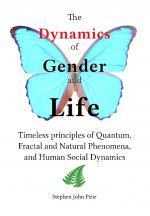[Excerpt Be and Become, © ProCreative, Sydney 2000]
As suggested earlier in this chapter, the distinction of reality being physical (Finite, Knowable and measurable) and "spiritual" (Infinite, Non-physical, Unknowable and Immeasurable) may not at first appear significant, but as will be more fully explained throughout this book, a bias towards either the physical (Knowable) or the Unknowable explains basically all of human behavior.
For example, Eastern societies have traditionally leaned towards accentuating and experiencing the Unknowable to the extent that they regard the spiritual (Unknowable) as being the “primary reality” while our everyday world of people, cars and trees is considered an off-shoot, or secondary reality. As David Bohm, the late physicist and protege of Einstein observed ...
In the prevailing philosophy in the Orient the immeasurable (i.e that which cannot be named, described, or understood through any form of reason) is regarded as the primary reality.1
In other words, while our Western culture is orientated towards believing that the physical universe is a primary component of existence, Eastern (Oriental) cultures are orientated towards believing that the spiritual (Unknowable) is primary. Aspects of our reality which are spiritual (Unknowable) lay in the realm of the mysterious. As a result, we can readily observe that Eastern cultures celebrate mystery, while we (in the West) celebrate facts. Hence our educational institutions being "fact-factories."
In view of the foregoing, we can add “Eastern culture,” and “Western culture” as the heading to TOA9 for the Unknowable and Known columns (resp.). With the inclusion of these two perspectives, it needs to be remembered at this point that Western cultures are not entirely “KNOWN,” limited or lacking in mystery. Western cultures lean towards exemplifying KNOWN qualities, such as being definitive, “factual” cultures which lack tolerance of mysterious (inexplicable) events.
Eastern cultures do not embody all things Unknowable and are not unlimited, but instead lean towards exemplifying the qualities of the unknowable and the mysterious in their cultures. As David Bohm once observed:
It is clear that the different ways the two societies have developed fit in with their different attitudes to measure. Thus, in the West, society has mainly emphasized the development of science and technology (dependent on measure) while in the East, the main emphasis has gone to religion and philosophy (what are directed ultimately towards the immeasurable).2
In being biased towards proof, fact and technology, Western cultures discount or downplay the role of intuition, mystery and imagination.
We are so very much more comfortable with facts and reason (the Finite-Known) than we are with mystery, emotion and the spiritual (the Infinite and the Unknowable). As the late physicist David Bohm wrote
One reason why we do not generally notice the primacy of the implicate order is that we have become so habituated to the explicate order, and have emphasized it is so much in our thought and language, that we tend to strongly feel that our primary experience is of that which is explicate and manifest.3
 "The Dynamics of Gender and Life" ebook is now available at
"The Dynamics of Gender and Life" ebook is now available at